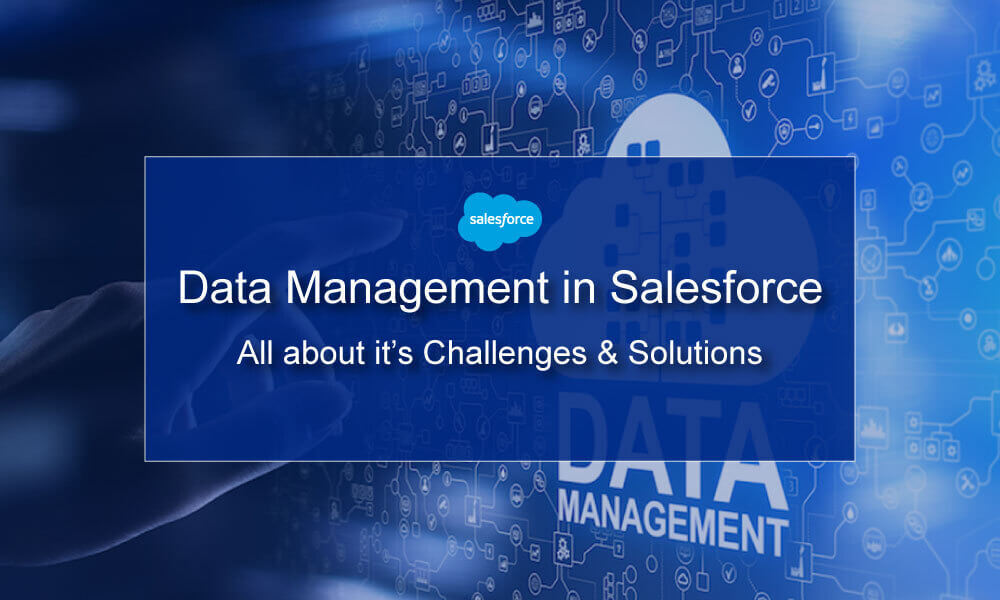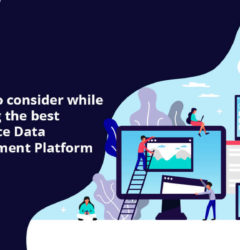
Data is at the heart of everything that happens in businesses, being the engine driving the Salesforce instance. Enterprises are making use of Big Data more than ever before to inform business decisions and gain deep insights into customer behavior, trends, and opportunities for creating extraordinary customer experiences. As business decisions rely heavily on such data, it becomes critical to properly manage the data in order to facilitate informed decision-making.
To make sense of the copious amount of data that enterprises gather, analyze, and store today, companies make use of data management solutions. Data management is an administrative process that includes acquiring, validating, storing, protecting, and processing available data to ensure its accessibility, reliability, and timeliness. Data management is definitely the most viable solution for handling the massive volume of datasets in Salesforce. Managing data makes processing, validation, and other essential functions much simpler and less time-intensive. It also helps in adhering to different regulatory compliance requirements such as GDPR and CCPA.
Data Management Challenges in Salesforce
While some companies are good at collecting data, they face a hoard of difficulties when it comes to managing it well enough to make sense of it. Some of the prominent challenges faced by organizations include the following:
- Multitude of data – One major issue is the bulk amounts of data being generated from an increasing number and variety of sources. This includes sales events, marketing campaigns, customer interactions, and many more. This makes it difficult to keep track of all the data and manage what data it is, where it is stored, and how to ultimately use it.
- Constantly changing Compliance Requirements – Compliance regulations are complex and multi-jurisdictional, and also change constantly. Enterprises need to be updated about new changes and be able to easily review their data and identify anything that falls under the modified requirements.
- Repurposing legacy data – Most of the times organizations are unsure about repurposing their data and putting it to use. Collecting and identifying data loses its value if it isn’t processed quickly. If it takes a lot of time and effort to convert the data into usable material, then analysis will not lead profitable results.
- Data Storage issues – Organizations have to keep up with frequent changes in data storage techniques. The data which is stored across multiple systems, like internal storage, data warehouses, and third-party systems, needs to be quickly and easily transformed from its original format into the format or model needed for analyzing it. This becomes a daunting task for enterprises when the Salesforce data storage limitations also come into play.
Solutions to combat the Challenges in Data Management
An enterprise stands to drastically improve the way its data is managed by taking care of some important factors. Firstly, the data available in the system should be reliable for it to be used for carrying out analytics. This data should be end-to-end documented so as to help in easily identifying and resolving issues. Lastly, the organization should have a competent backup and archiving strategy in place to cut back the risks involved in data management.
There are several means through which the highly coveted ‘efficient data management’ can be achieved:
- Salesforce Data Loader – Several built-in tools like the Salesforce Data Loader, designed to facilitate bulk import or export of data into and out of the Salesforce CRM platform, are available to the organization. This application allows users to insert, update, export, or delete up to 5 million Salesforce records according to their specific needs and requirements.
- Salesforce Accelerators – Salesforce also offers a number of ‘accelerators’ that simplify the data management process without having to leave the internal platform. Some of the most prominent accelerators include the Customer Master Data Harmonization Accelerator, the Data.com Data Quality Assessment Accelerator, and the Prevent Duplicate Records Accelerator.
- AppExchange Solutions – In recent times, more and more third-party do-it-yourself data management applications are also cropping up that can also be explored through the AppExchange marketplace. These solutions can be used to perform every possible function, from project management to data visualization, and are valuable when there are budget constraints.
Archiving data is an essential aspect of efficient data management but it comes with its own set of questions regarding storage, data integrity, data analytics, security, accessibility and much more. To make life easier for a Salesforce admin, DataArchiva is a must-have application. This native level Salesforce data archiving tool lets you archive all your legacy data automatically to Salesforce’s own big data-based storage systems called Big Objects ensuring top-notch security, seamless accessibility, 85%+ storage cost reduction, and better performance along with data governance. If you want to know more in detail, set up a demo here.
![WEBINAR: Master the ABC of Efficient Salesforce Data Management [Archive & Backup]](https://demo.dataarchiva.com/wp-content/uploads/2021/05/DA-Webinar-Blog-240x250.png)








